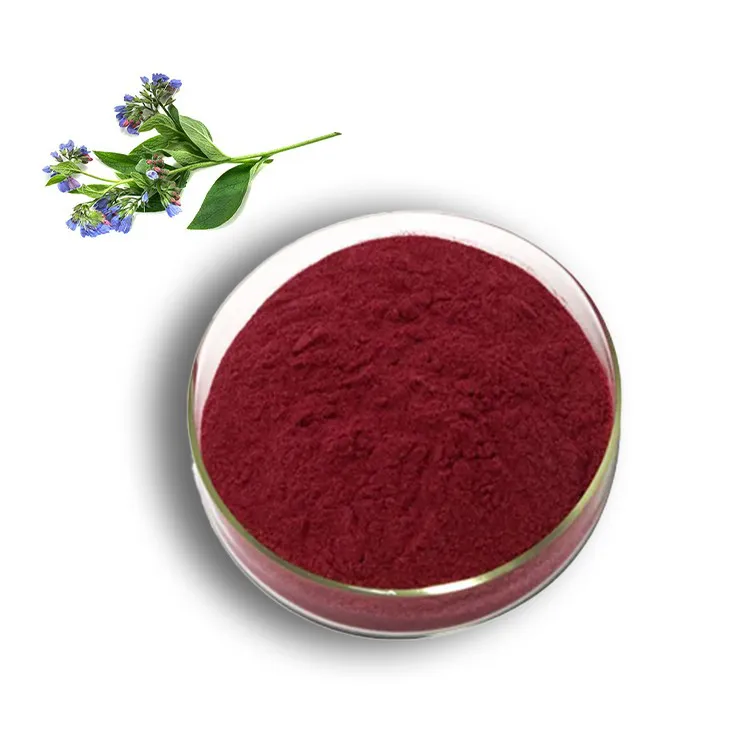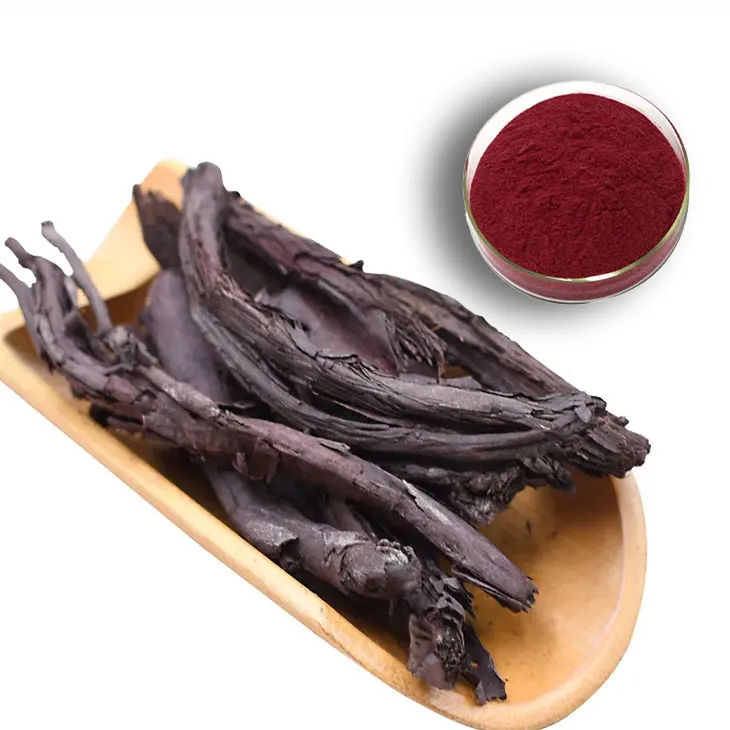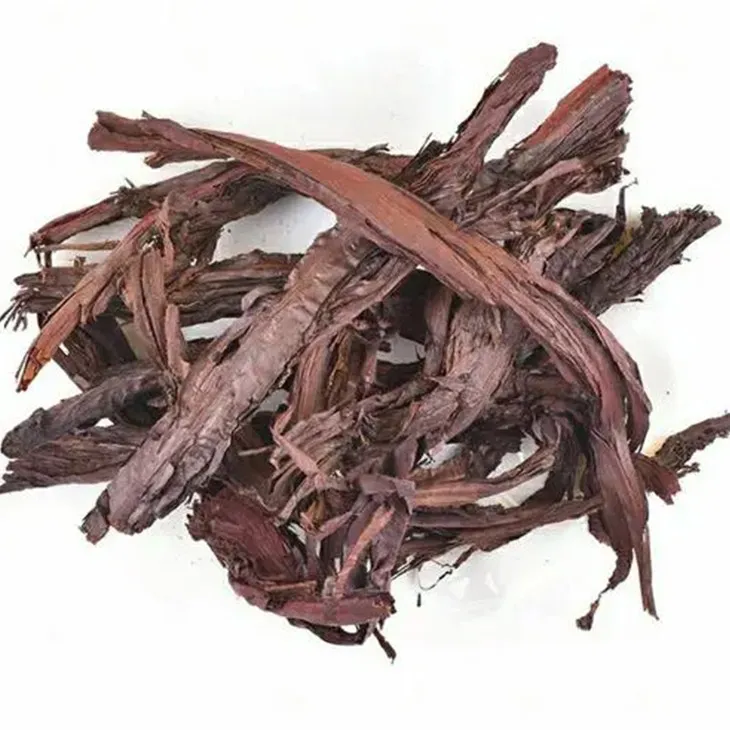- 0086-571-85302990
- sales@greenskybio.com
Application of Shikonin in Skin Care.
2024-11-11

1. Introduction to Shikonin
Shikonin is a remarkable natural compound that has been drawing significant attention in the field of skin care. It is derived from plants, particularly from the roots of the Arnebia euchroma and Lithospermum erythrorhizon plants. Shikonin has a long history of use in traditional medicine in some Asian cultures for treating various skin disorders. In modern skin care, it is emerging as a potent ingredient with a wide range of beneficial properties.

2. Anti - inflammatory Properties of Shikonin
2.1. Mechanism of Action
One of the most important aspects of shikonin in skin care is its anti - inflammatory properties. Inflammation is a common skin issue that can be caused by various factors such as environmental stressors, allergens, and skin infections. Shikonin works by inhibiting the production of pro - inflammatory cytokines and mediators. These cytokines, such as interleukin - 1 (IL - 1) and tumor necrosis factor - alpha (TNF - α), play a crucial role in initiating and perpetuating the inflammatory response in the skin. By suppressing their production, shikonin helps to reduce the redness, swelling, and pain associated with skin inflammation.
2.2. Clinical and Experimental EvidenceSeveral studies have provided evidence of shikonin's anti - inflammatory effects. In vitro experiments have shown that shikonin can significantly reduce the expression of inflammatory genes in skin cells when exposed to inflammatory stimuli. In vivo studies on animal models have also demonstrated that topical application of shikonin - containing formulations can effectively reduce skin inflammation caused by irritants or allergens. For example, in a study where mice were subjected to chemical - induced skin irritation, the group treated with shikonin - based cream showed a much faster reduction in redness and swelling compared to the control group.
2.3. Benefits for Skin ConditionsThese anti - inflammatory properties make shikonin highly beneficial for various skin conditions. For those with sensitive skin, shikonin can help soothe the skin and reduce the frequency and severity of flare - ups. It is also potentially useful in the treatment of inflammatory skin diseases such as eczema and psoriasis. In eczema, shikonin may help to control the itchy, inflamed patches of skin, while in psoriasis, it could potentially reduce the characteristic red, scaly plaques by modulating the inflammatory response.

3. Antioxidant Abilities of Shikonin
3.1. Free Radicals and Skin Aging
The skin is constantly exposed to environmental factors that generate free radicals. These free radicals are highly reactive molecules that can cause damage to the skin's cells, proteins, and DNA. This damage is a major contributor to skin aging, leading to the appearance of wrinkles, fine lines, and loss of skin elasticity. Shikonin, with its antioxidant abilities, acts as a powerful defender against these free radicals.
3.2. How Shikonin Acts as an AntioxidantShikonin functions as an antioxidant by donating electrons to neutralize free radicals. It can scavenge various types of free radicals, including superoxide anions, hydroxyl radicals, and singlet oxygen. By doing so, it prevents these free radicals from oxidizing important skin components. Moreover, shikonin has been shown to enhance the activity of the skin's endogenous antioxidant enzymes, such as superoxide dismutase (SOD) and glutathione peroxidase (GSH - Px). These enzymes play a crucial role in the body's natural antioxidant defense system, and shikonin's ability to boost their activity further strengthens the skin's protection against oxidative stress.
3.3. Anti - aging EffectsThe antioxidant properties of shikonin translate into significant anti - aging effects. Regular use of skin care products containing shikonin can help to maintain the skin's youthful appearance. It can slow down the formation of wrinkles and fine lines by preventing the breakdown of collagen and elastin, which are essential for skin firmness and elasticity. Additionally, shikonin can improve the overall texture and tone of the skin, giving it a more radiant and healthy look.

4. Antimicrobial Effects of Shikonin
4.1. Types of Microorganisms Affected
Shikonin exhibits broad - spectrum antimicrobial activity, which is another valuable property in skin care. It can effectively combat a variety of microorganisms, including bacteria, fungi, and viruses. Among bacteria, shikonin has been shown to be active against both gram - positive and gram - negative bacteria. For example, it can inhibit the growth of Staphylococcus aureus, a common pathogen associated with skin infections such as acne and impetigo. In terms of fungi, shikonin has demonstrated activity against dermatophytes, which are responsible for fungal skin infections like ringworm and athlete's foot.
4.2. Mode of Action against MicrobesThe antimicrobial action of shikonin is multi - faceted. It can disrupt the cell membrane of microorganisms, leading to leakage of intracellular contents and ultimately cell death. Shikonin also interferes with the metabolic processes of microbes, inhibiting their growth and reproduction. For example, it may disrupt the synthesis of essential proteins or nucleic acids in bacteria or fungi, thereby preventing their proliferation.
4.3. Importance for Skin HealthBy having antimicrobial effects, shikonin helps to keep the skin clean and healthy. It can prevent the colonization of harmful microorganisms on the skin surface, reducing the risk of skin infections. In acne - prone skin, shikonin can target the Propionibacterium acnes bacteria, which play a role in the development of acne lesions. By controlling the growth of these bacteria, shikonin - containing products can potentially reduce the occurrence and severity of acne breakouts. Similarly, in fungal skin infections, shikonin - based formulations may offer an alternative treatment option with fewer side effects compared to some traditional antifungal drugs.
5. Incorporation of Shikonin in Skin Care Products
5.1. Types of Skin Care Products
Shikonin can be incorporated into a wide variety of skin care products. Creams, lotions, and serums are the most common forms. In creams and lotions, shikonin can be blended with other emollients, humectants, and thickeners to create a product that provides both skin - care benefits and a pleasant texture. Serums, which are often more concentrated, can deliver a higher dose of shikonin directly to the skin for more intensive treatment. Additionally, shikonin can also be found in some masks, which are designed for periodic intensive skin treatment.
5.2. Formulation ConsiderationsWhen formulating skin care products with shikonin, several factors need to be considered. The solubility of shikonin is one aspect. Since it is a relatively hydrophobic compound, appropriate solubilizers may need to be used to ensure its uniform distribution in the product. The stability of shikonin also needs to be maintained. Exposure to light, heat, and certain chemicals can cause it to degrade, so proper packaging and storage conditions are crucial. For example, products containing shikonin may be packaged in opaque or dark - colored containers to protect it from light exposure.
5.3. Compatibility with Other IngredientsShikonin needs to be compatible with other ingredients in the skin care product. It should not interact in a way that reduces its effectiveness or causes adverse reactions. For instance, it should be tested for compatibility with preservatives, fragrances, and other active ingredients. Some ingredients may enhance the activity of shikonin, while others may need to be carefully selected to avoid any negative interactions.
6. Safety and Precautions of Shikonin in Skin Care
6.1. Allergic Reactions
While shikonin is generally considered safe for use in skin care, there is a potential for allergic reactions in some individuals. People with a history of allergies, especially to plants from which shikonin is derived, may be at a higher risk. Skin patch tests are recommended before using shikonin - containing products for the first time. If a person experiences redness, itching, or swelling at the patch test site, it indicates a possible allergic reaction and the product should not be used.
6.2. Dosage and ConcentrationThe dosage and concentration of shikonin in skin care products also need to be carefully regulated. Using products with too high a concentration of shikonin may cause skin irritation. Manufacturers need to ensure that the concentration is within a safe and effective range. Additionally, over - use of shikonin - containing products should be avoided, as excessive exposure may not necessarily provide additional benefits and could potentially lead to adverse effects.
7. Future Perspectives
7.1. Research Directions
There are several promising research directions for shikonin in skin care. One area is further exploring its potential in combination therapies. For example, combining shikonin with other anti - inflammatory or antioxidant agents may lead to enhanced therapeutic effects. Another direction is to study its long - term effects on skin health. While short - term studies have shown its benefits, more research is needed to understand how continuous use of shikonin - containing products affects the skin over time.
7.2. Potential New ApplicationsNew applications of shikonin in skin care may also be on the horizon. For instance, its ability to modulate the skin's immune response could potentially be exploited for the treatment of autoimmune skin disorders. Additionally, with the growing interest in natural and sustainable skin care, shikonin may find new uses in formulating "green" skin care products that are both effective and environmentally friendly.
FAQ:
What is shikonin?
Shikonin is a natural compound that has shown various beneficial properties in skin care. It is being increasingly studied for its potential in improving skin health.
How does shikonin reduce skin redness?
Shikonin has anti - inflammatory properties. These properties help in reducing the inflammation in the skin which is often associated with redness and irritation, thus making the skin look less red.
What role does shikonin play in preventing premature aging?
Shikonin has antioxidant abilities. Free radicals in the environment can damage the skin cells and lead to premature aging. Shikonin combats these free radicals, protecting the skin cells and thus preventing premature aging.
How does shikonin keep the skin clean?
Shikonin has antimicrobial effects. Microbes on the skin can cause various problems. The antimicrobial properties of shikonin help in fighting against these microbes, thus keeping the skin clean and healthy.
Are there any side effects of using shikonin in skin care products?
While shikonin has many beneficial properties, more research is needed to fully understand if there are any potential side effects. Currently, in the normal usage concentration in skin care products, no significant side effects have been widely reported, but individual sensitivities may vary.
Related literature
- The Role of Shikonin in Dermatological Disorders: A Review"
- "Shikonin - Based Skin Care: Efficacy and Safety"
- "Exploring Shikonin's Potential in Cosmetic Dermatology"
- ▶ Hesperidin
- ▶ citrus bioflavonoids
- ▶ plant extract
- ▶ lycopene
- ▶ Diosmin
- ▶ Grape seed extract
- ▶ Sea buckthorn Juice Powder
- ▶ Beetroot powder
- ▶ Hops Extract
- ▶ Artichoke Extract
- ▶ Reishi mushroom extract
- ▶ Astaxanthin
- ▶ Green Tea Extract
- ▶ Curcumin Extract
- ▶ Horse Chestnut Extract
- ▶ Other Problems
- ▶ Boswellia Serrata Extract
- ▶ Resveratrol Extract
- ▶ Marigold Extract
- ▶ Grape Leaf Extract
- ▶ blog3
-
High purity olive leaf extract
2024-11-11
-
Lavender oil extraction method
2024-11-11
-
100% organic virgin sea buckthorn fruit oil
2024-11-11
-
Lotus leaf extract powder factory in China
2024-11-11
-
China aged garlic extract supplier
2024-11-11
-
Deer antler extract powder manufacturer
2024-11-11
-
Saw palmetto extract vs whole herb
2024-11-11
-
Avocado Extract Powder
2024-11-11
-
Curcumin Extract
2024-11-11
-
Lily extract
2024-11-11
-
Grape Leaf Extract
2024-11-11
-
Ginger Extract
2024-11-11
-
Rosemary extract
2024-11-11
-
Resveratrol extract
2024-11-11
-
Cactus Extract
2024-11-11
-
Bayberry Extract
2024-11-11
-
Konjac Powder
2024-11-11





















